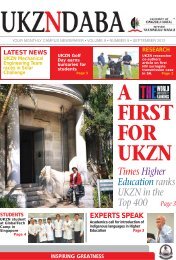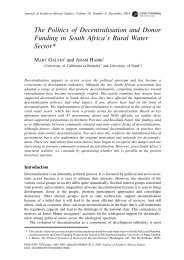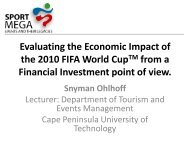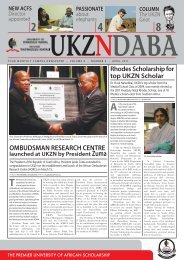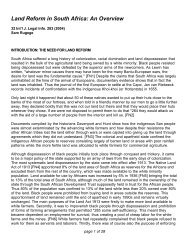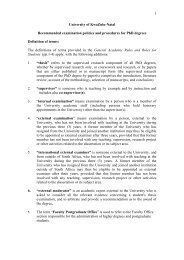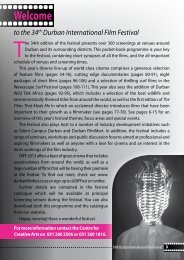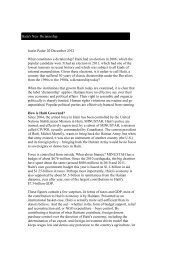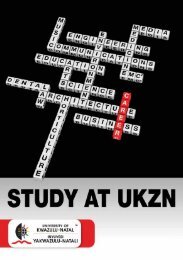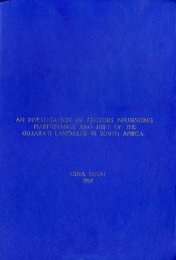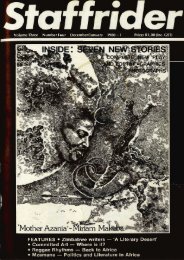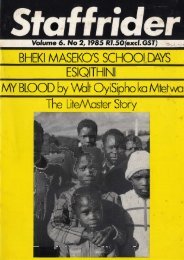NDABA MAY 2006.pmd - University of KwaZulu-Natal
NDABA MAY 2006.pmd - University of KwaZulu-Natal
NDABA MAY 2006.pmd - University of KwaZulu-Natal
Create successful ePaper yourself
Turn your PDF publications into a flip-book with our unique Google optimized e-Paper software.
UKZN achieversPicture: Vicky CrookesGift <strong>of</strong> the GiversbursariesThe 2006 Gift <strong>of</strong> the Giversbursary and scholarshipholders were presented toDr Sooliman, founder <strong>of</strong> theorganisation, at a function on thePietermaritzburg campus. Thishumanitarian and disaster relieforganisation has contributedR1.3 million towards scholarshipsand bursaries for undergraduatestudents in the agricultural fields.Dr Sooliman expressed his pleasureat being involved with the School<strong>of</strong> Agricultural Sciences and Agribusinessand congratulated therecipients. He emphasised theimportance <strong>of</strong> agricultural developmentin Africa and commented that“seventy percent <strong>of</strong> economies inAfrica depend on agriculture” andtherefore, “we want agriculture tocome right to the top”.- Vicky CrookesThe 2006 bursary and scholarship holders with Dr Sooliman (left-right) Nonhlanzeko Mthembu, Thandi Msomi,Nqobile Nkosi, Dr Sooliman, Pam Neubert, Michelle Brown, Cindy Moon, and Nkosi Mkwanazi.Global leadersUKZN students Rebecca Arangiesand Amy Juliet Morrow are two <strong>of</strong>the six South African students whohave been named 2006 GoldmanSachs Global Leaders.For five years, the Goldman SachsGlobal Leaders Programme hasidentified and developed some <strong>of</strong>the world’s most promising futureleaders. The UKZN students areamong 100 outstanding secondyearstudents selected from over 70<strong>of</strong> the world’s top colleges anduniversities.Goldman Sachs Global Leaders,who represent more than 40 countriesto date, are chosen preciselybecause they already know how tomake a difference in the world. Inaddition to their academic achievements,many have already begun t<strong>of</strong>ind solutions for problems acrossthe globe. Amy Morrow, for example,initiated a public awarenessand community outreach programmein the Tongaat, Kwa Zulu-<strong>Natal</strong> area in 2005. This initiativehas subsequently been namedHIVACT and takes the form <strong>of</strong> aschool society that focuses on Aidsawareness and education in theschool and community. Continuedmonitoring and research <strong>of</strong> itseffectiveness is done.“Global Leaders are extremelytalented academically and havealready shown proven leadershipabilities and a strong interest inglobal affairs,” said Stephanie Bell-Rose, President <strong>of</strong> The GoldmanSachs Foundation, as she announcedthe 20 US and Canadian2006 Goldman Sachs GlobalLeaders. “Goldman Sachs and IIEcreated this programme to help thesepromising young people developtheir leadership skills and goals ata critical juncture in their academiccareers in order to become evenmore effective agents <strong>of</strong> change.”Each Global Leader receives a$3 000 grant for educationalexpenses. In addition, 50 <strong>of</strong> thisyear’s 100 Global Leaders,including Ms Morrow, have beenselected to participate in theannual Goldman Sachs GlobalLeadership Institute, July 8-14,2006, in New York City. At theInstitute, they will spend time withrenowned leaders from the private,public and nonpr<strong>of</strong>it sectors,learning about leadership andglobal issues.stThe 1 st LEAP Academy 2006EVOLVING policy, legislativeframeworks and other environmentalfactors have redefinedthe notion <strong>of</strong> leadership inHigher Education. No longercan university leaders andmanagers slip into an administrativecareer stream withoutspecialist training. Theleadership and managementfunctions <strong>of</strong> the modern HigherEducation institution demandparticular knowledge and skillsthat cannot be developed fullythrough the process <strong>of</strong> osmosisby which past and currentgenerations <strong>of</strong> university administratorshave had littlechoice but to learn their jobs.The LEAP Academy, which isfunded by the Carnegie Corporation,reflects the <strong>University</strong> <strong>of</strong><strong>KwaZulu</strong>-<strong>Natal</strong>’s proactiveapproach to building the leadershippipeline. Ms Reena Budree,Co-Project leader for LEAP, saysthat the Academy is intended t<strong>of</strong>ill a very serious trainingvacuum by providing up-to-date,cutting-edge and locally relevanttraining for new and emergingleaders and managers within the<strong>University</strong>.The Academy incorporates ongoingshort pr<strong>of</strong>essional developmentworkshops and seminars,networking opportunitiesand culminates in a 4-day interactiveworkshop.Presenters are experts in theirfield drawn from South Africaand where possible internationally.The Academy is aimed at existingand aspirant Deans, DeputyDeans, Heads <strong>of</strong> Schools andDirectors <strong>of</strong> Support Divisions.The response to the first call forparticipants was phenomenal.Applications are submittedthrough the Deputy Vice-Chancellor/ Head <strong>of</strong> the College<strong>of</strong> operational unit.The first Module on 29 Mayheld at the <strong>University</strong> InnovationCentre, entitled AcademicPlanning, was presented byPr<strong>of</strong>essor Nthabiseng AudreyOgude, Deputy-Vice Chancellor(Academic) at the NelsonMandela Metropolitan <strong>University</strong>.Pr<strong>of</strong>essor Ogude.Pr<strong>of</strong>essor Ogude is an accomplishedacademic and researcher.When she became the first blackwoman to obtain a doctorate inanalytical chemistry at Wits<strong>University</strong> in 1992, she did notsee it as something to be proud<strong>of</strong>: “Instead, I found it sad, andalmost ridiculous,” she reflects.“It reminded me <strong>of</strong> the history<strong>of</strong> this country more thananything else. It says somethingabout South Africa that it tookthat long for a black women toachieve something like this.”The second session on 12 June2006 was on Partnership Developmentand Institutional Advancement,presented by Pr<strong>of</strong>essorMahlubi Mabizela, ResearchSpecialist in the Education,Sciences, and SkillsDevelopment (ESSD) ResearchProgramme <strong>of</strong> the Human SciencesResearch Council (HSRC).There was also a workshop byMs Shelagh Gastrow entitled“Exploring the Donor World”.Shelagh Gastrow is the ExecutiveDirector <strong>of</strong> Inyathelo: TheSouth African Institute forAdvancement which she helpedto establish in 2002.Pr<strong>of</strong>essor Mahlubi Mabizela.The next module on ResearchPlanning and Development is on26 June. Presenters includePr<strong>of</strong>essor Cheryl De La Rey,Deputy Vice-Chancellor Researchat the <strong>University</strong> <strong>of</strong> CapeTown, Gerhad Moolman andAndrew Kaniki from the NRFas well as Pr<strong>of</strong>essor AhmedBawa.6



